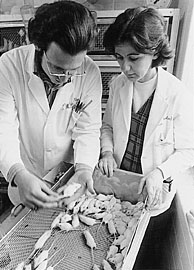
NSF Director Is Unstoppable
Since taking over as director of the NSF, Colwell, who wakes up every morning at 5 to go jogging no matter what city she is in, hit the ground running. At her swearing in ceremony at the White House, an NSF staffer awed by Colwell's 12-hour workdays pulled aside Colwell's daughter, Alison, a Seattle government scientist, and asked, "Is she always like this? She has more energy than anyone we have ever seen." Alison laughed. "Yes, she is always like this," she said.
Under her leadership, the NSF has won significant budget increases from Congress and now President Clinton is asking for a 17 percent increase to strengthen core science and engineering disciplines while moving forward in interdisciplinary areas. (The NSF, an independent U.S. government agency, is responsible for promoting science and engineering through programs that invest more than $3.5 billion a year in nearly 20,000 research and education projects nationwide. NSF-funded research has led to such breakthroughs as magnetic resonance imaging, lasers, the Internet and Doppler radar.) She also unveiled a new initiative in "biocomplexity," which examines the interaction of biological, physical and social systems on earth.

Colwell (right) and a graduate student at the University of Maryland examine a tray of mice injected with a Vibrio parahaemolyticus toxin, part of the early work on marine vibrios begun at the UW and continued at Maryland. Photo courtesy of Rita Colwell.
It's obvious Colwell knows what she is doing. Her biocomplexity initiative has drawn more than 600 proposals for funding from universities around the country. In the past, a program drawing 100 proposals was thought to be doing well.
Her success is a vindication of sorts, since her background as a biologist is a significant break from the past at the NSF, where the vast majority of its previous directors were physicists and engineers. "Her appointment is recognition that we live in a biological world," explains Jody Deming, a UW oceanography professor who was a graduate student under Colwell at the University of Maryland. "That is a vision that has been missing. She is putting the emphasis on the earth as a biological entity."
She pulls it off with an arsenal of skills that include classroom smarts, research ability, administrative wizardry, a perpetual-motion work ethic, a near photographic memory, a bottomless pit of ideas and enthusiasm, an ability to delegate, and a political sense that is admired far and wide. "She has a unique ability to present to audiences ranging from Brownies to congressmen and their aides to fellow scientists," remarks Gaylen Bradley, the vice president for academic affairs at the University of Maryland's Biotechnology Institute.
Yet, if you ask Colwell (who went by the nickname "Ricky" during her time at the UW from 1957 to 1964), she had no such lofty aspirations as a youngster growing up the fifth of six kids in the seaside town of Beverly, Mass. "I was curious to see how things worked," she says. "I loved nature."
She and her family spent a lot of time at the ocean, puttering around tide pools. And though her parents (her dad was a construction worker, her mom a housewife) didn't go to college, education was always stressed at home. At an early age, Colwell's destiny was set. While a sixth-grader attending school in a four-room schoolhouse, she was called into the principal's office after taking a standardized science test. "I was terrified," Colwell recalls.
The principal sat her down, shook his finger at her and said, "You have a responsibility. You just got the highest score ever on this test. You have to go to college."
Chemistry was her first love (girls weren't even allowed to take physics then), but the straight-A student had her first encounter with the "glass ceiling" when her high school chemistry teacher told her not to bother with chemistry in college since it was not a profession for women.
Go To: Page 1 | Page 2 | Page 3 | Page 4
- Return to June 2000 Table of Contents